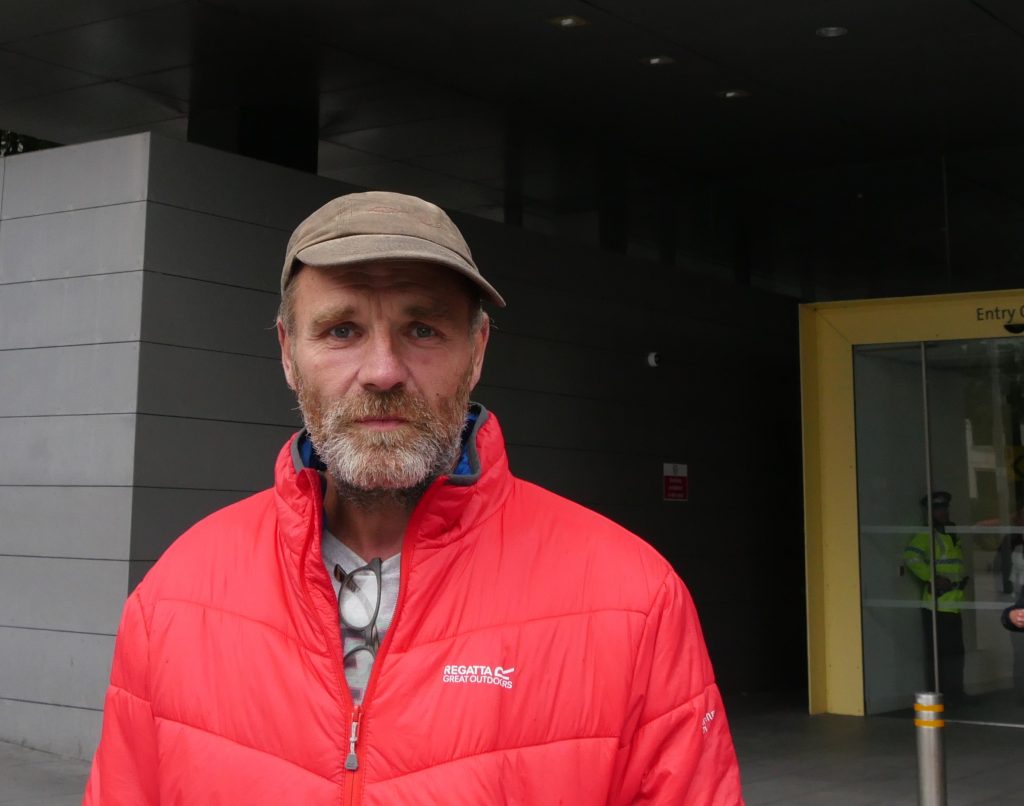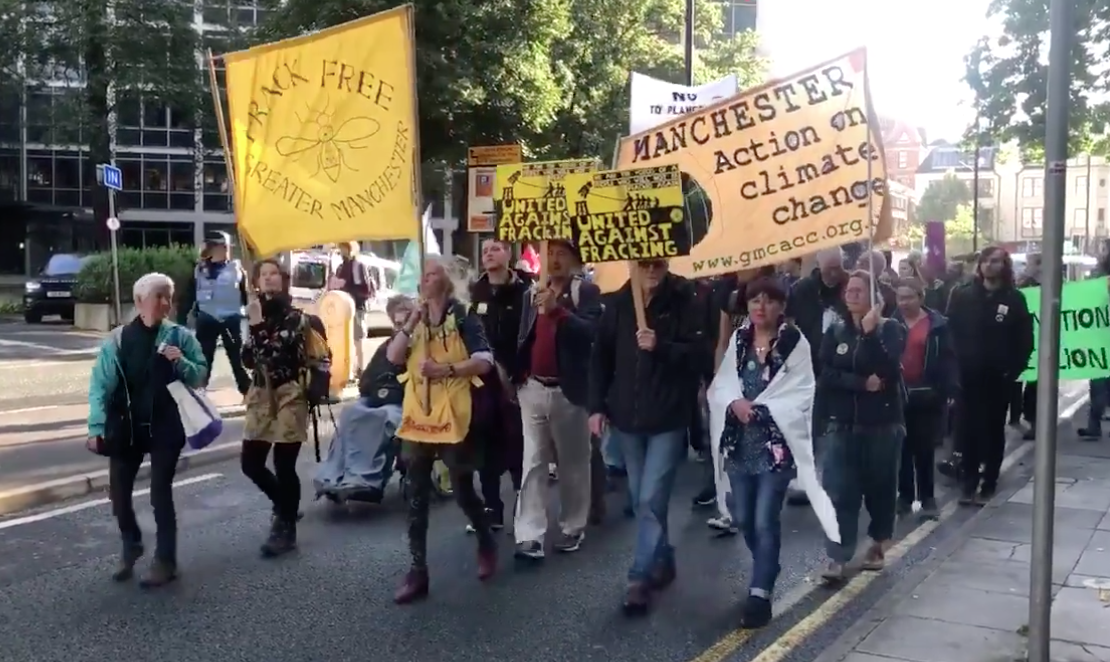Three campaigners who breached an injunction restricting protest at a shale gas site struck by what is believed to be the UK’s biggest fracking tremor should not be punished, a court heard.
Christopher Wilson, 55; Katrina Lawrie, 41; and 44-year-old Lee Walsh are due to be sentenced on Tuesday (3 September 2019) after being found in contempt of court in July this year.
The three took part in a “lock on” protest on 24 July 2018. Fastening themselves together, they blocked traffic going in and out of the shale gas site near Blackpool in Lancashire – owned by energy company Cuadrilla – for around six-and-a-half hours.
Lawrie is also being sentenced for a separate incident in which she ran into Preston New Road in August last year, causing a lorry to swerve out of the way.
Manchester Civil Justice Centre on Monday heard barristers for Cuadrilla and the campaigners make the case for what penalty, if any, the trio should face.
The latter also applied to lift a “draconian” injunction curtailing protest at the site while fracking remains indefinitely suspended, as well as applying to amend some of its restrictions on human rights grounds.
Regulators ordered Cuadrilla to suspend fracking at its Preston New Road site after tremors were recorded last Monday, including a tremor with a magnitude of 2.9 on the Richter scale, believed to be the biggest fracking-related tremor experienced in the UK.
Local Tory MP Mark Menzies demanded an end to fracking in the area after the tremor, saying it was “unsafe”.
‘Vindicated By History’

Christopher Wilson is among three anti-fracking protesters due to be sentenced for contempt of court on Tuesday 3 September. Credit: Aaron Walawalkar.
Defence barrister Richard Brigden, representing Wilson, urged Judge Mark Pelling QC to dwell on the fact that this case concerns peaceful protest and civil disobedience.
He quoted a previous judgment stating that, in cases involving protesters, breaches in the law are sometimes “vindicated by history”. “The suffragettes are an example that immediately comes to mind,” he said.
“We may potentially be in territory where history does not vindicate them but that they have been vindicated already,” he added. “Fracking has caused a magnitude 2.9 earthquake. Houses were shaking. Businesses, locals and others have come out against fracking in a way that they have not done before.”
Protesters who act with restraint – by not exercising violence or extending their protest longer than necessary – should expect the same from those judging them, he added.
Arguing for no penalty, Brigden said: “The spectre of a prison sentence has hung over them for about a year and that has had a deterrent effect on them”.
He added that Wilson, a former soldier, “has served his country and continues to serve his country in doing what he does. There is no selfish motive here”.
Barrister Adam Wagner, representing Walsh and Lawrie, added that the latter’s actions which caused a lorry to swerve on Preston New Road did not result in any harm or damage to property.
Judge Pelling had ruled out imposing a prison sentence and said his options were either a fine or a suspended sentence or to give no penalty.
The court heard that the protestors have no means of paying any fines save for Wilson’s Ministry of Defence pension of £300-a-month.
Barrister Tom Roscoe, representing Cuadrilla, argued that the protesters should be given a suspended sentence and a prohibition order banning them from going within 250m of Preston New Road for 12 months.
Challenge To The Injunction: ‘How Slow Is Slow?’
Scenes outside Manchester Civil Justice Centre this morning. Environmentalists found to have breached an injunction restricting protest at a fracking site near Blackpool are due to be sentenced.
They have applied to vary the terms of the injunction which may impact sentencing. pic.twitter.com/fg0NyUIwgS
— Aaron Walawalkar (@AaronWala) September 2, 2019
Protest is protected in common law and by Articles 10 and 11 of the Convention of Human Rights – the rights to freedom of expression and freedom of assembly.
Both these rights are qualified. This means public authorities can take proportionate action to interfere with them if it is (for example) in the interest of public safety, the prevention of disorder or crime, or the protection of other people’s rights and freedoms.
In light of last week’s earthquake, Wagner said that “the circumstances have materially altered”.
“The change surely affects the balance of convenience in this case as well as the proportionality from a human rights perspective.”
He added: “It is not my clients who are the real danger here. It is Cuadrilla.”
He argued that there is no need for an injunction with no fracking taking place on site and suggested that it could be returned, “albeit in a less draconian form”, when fracking recommences.
He cited a number of the injunction’s restrictions as being “too-wide” and “insufficiently clear,” including a ban on “slow walking in front of vehicles with the object of slowing them down and causing them inconvenience and delay”.
“How slow is slow?” Wagner asked the court. “Any speed slower than a normal walking speed of two miles per hour? One does not know.”
Roscoe argued that the injunction should remain in place in spite of the suspension on fracking, as vehicles continue to move around the site for maintenance and testing, among other purposes.
Responding to the difficulties in defining slow walking, he suggested that walking along sections of Preston New Road at either side of site entrance should be prevented altogether.
“Why should anyone on this stretch of access road be walking in the carriageway at all?” he said. “Where there is a footpath, they should not be walking in the carriageway.”
But it was said that this wording could capture those simply seeking to cross the road and could create uncertainty to how many times it is acceptable to cross the road – leading to a “chilling effect” on protest.
The two barristers sparred at length over the nuances of the wording of the injunction.
Roscoe suggested including a sentence which would prohibit protesters from attaching themselves to one another. But it was argued that this could capture those holding hands or tightly hugging.
While someone helping another person trapped under a car could fall foul of a proposed clause intended to prevent interference with vehicles, it was suggested.
Environmental organisation Friends of the Earth was due to intervene in the case but representatives say they were ‘priced out’ after Judge Pelling refused to grant them protection from costs projected to reach £85,000 if they lost.
A judgment is expected to be handed down on Tuesday 3 September 2019 at 11.30am.
Adam Wagner is chairman and founder of RightsInfo. He played no role in writing this article.
Want to learn more on this topic?
- Read how the Court of Appeal overturned anti-fracking protesters’ prison sentences.
- Learn about the Stansted 15’s brush with the criminal justice system.
- Take a look at recent action on climate change in the UK’s capital.







